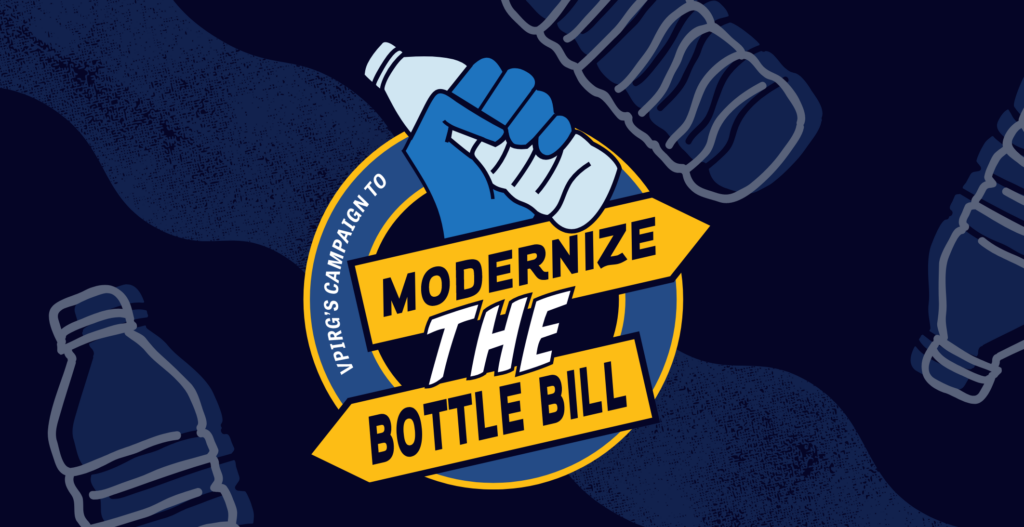Governor Phil Scott has vetoed legislation designed to update and substantially expand the scope of the state’s popular beverage redemption program, commonly known as the Bottle Bill.
The proposed legislation passed last Tuesday when the House of Representatives concurred with a version of the bill approved by the Senate last month. The House action came during a special one-day veto override session.
The Vermont Public Interest Research Group (VPIRG) has been one of the leading proponents of modernizing the Bottle Bill for many years. Marcie Gallagher, VPIRG’s Environmental Advocate, expressed frustration.
“This legislation represents a careful compromise that would modernize the Bottle Bill and bring critical benefits to consumers, small businesses, and our environment. More than four out of five Vermonters support this approach and the bill won tri-partisan support in both chambers. Unfortunately, the Governor instead sided with industry opponents. We’re deeply disappointed but look forward to working with legislators to override this misguided veto when the General Assembly reconvenes in January.”
In Vermont, a poll completed in 2021 found 88 percent of the state’s residents supportive of the Bottle Bill, and 83 percent favored expanding it to cover more beverages as H.158 would do. In 2021, VPIRG canvassers also collected more than 10,000 signatures from across the state in favor of updating the law.
But despite the broad public support for the Bottle Bill legislation, Governor Scott sided with industry opponents, including waste industry giant Casella Waste Systems. The Governor’s ties to Casella are well known; the company was a prominent sponsor of Scott’s racecar and has financially supported his campaigns for Governor. Casella earned scorn from legislators and environmentalists when it set up an “astroturf” group last legislative session as a front to oppose an updated Bottle Bill.
Elena Mihaly, Vermont Director at the Conservation Law Foundation (CLF) added: “Governor Scott’s veto of this important bill is yet another missed opportunity for Vermonters. We can’t keep burning and burying our trash, and the bottle bill included commonsense measures to increase recycling while saving money. Our legislators overwhelmingly approved this new law, and we’ll be pushing them to override this senseless veto.”
The bill is intended to modernize a law that has been on the books for more than 50 years. Key attributes of the bill are that it would:
- Add more redemption centers in the state by requiring a minimum of three redemption centers per county, along with a redemption center in any densely populated downtown and in any municipality of 7,000 or more people.
- Promote clean air, clean water, and a cooler climate by collecting many more containers each year to be recycled into new products again.
- Exempt small retailers from the redemption program while streamlining the process for redemption centers.
- Expand the scope of the program beginning in 2027 to cover more beverages such as water, sports drinks, hard cider, and wine.
“The Bottle Bill has been Vermont’s most successful recycling and anti-litter program for the past 50 years,” Gallagher added. “But it is becoming increasingly inconvenient for consumers as our local redemption centers struggle to stay afloat. It’s time to update the law as nearly every other state with a bottle deposit program has done and support our small businesses and communities.”
H.158 was designed to add more redemption centers and support our existing centers’ ability to make money and handle added capacity. Governor Scott has failed to acknowledge these provisions of the bill.
Kim Trombley, co-owner of Vermont Redemption, Incorporated – which operates redemption centers in Springfield, Vergennes, Hartford, Bradford, and formerly Hinesburg – said, “Our employees are literally sorting people’s trash! They deserve higher pay. We are constantly told by community members that we need to have more locations, more containers included in the deposit system, and more employees. We NEED help now to keep redemption going, and I’m disheartened that the governor is not listening to the small, independent businesses in Vermont who desperately need these changes.”
Bottle Bill supporters point out that virtually every container returned for redemption is recycled into another product – often a new beverage container. In contrast, materials collected through curbside recycling tend to be more contaminated and therefore much less valuable.
In one example of how the current system is failing Vermonters, the Chittenden Solid Waste District paid a penalty of $400,000 after being caught dumping glass that had been collected for recycling between 2013-2018. CSWD dumped an estimated 18,000 tons of glass over that period because its single stream material was too dirty to market.
This is the governor’s 9th veto so far this biennium.
# # #

